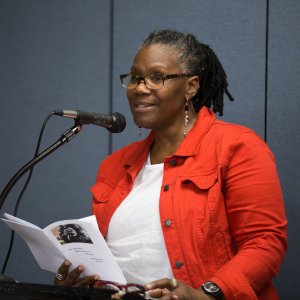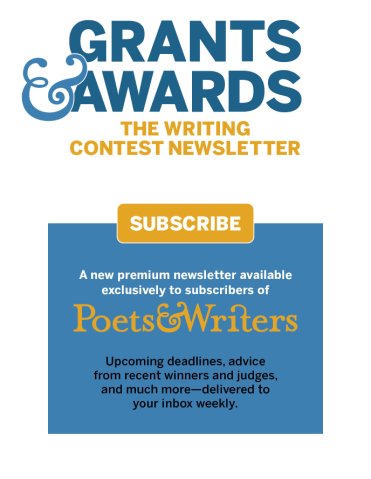Barnes & Noble CEO James Daunt discusses rejuvenating the bookstore’s brand with CNN. He also discusses curating the collection of books in each store, the personal touches in every branch, and how the younger generation of readers continues to be drawn to classic novels in addition to books of the moment (for instance, romantasy titles).
SIGN UP
Writing Prompts
-
In Laura Wolf Benziker’s short story “The Green World,” published in Evergreen Review, a...
-
What signals to you that spring has finally arrived? While there are signs of transformation...
-
In her memoir Things in Nature Merely Grow, forthcoming from Farrar, Straus and Giroux...
Tools for writers
Daily News
Keziah Weir writes for Vanity Fair about how Meta AI staffers concluded that more than seven million books have no “economic value.” Meta, which used millions of pirated books to train its AI, is arguing that the company’s use of copyrighted materials falls under the legal doctrine of “fair use.” The Association of American Publishers has rejected this claim, stating in an amicus brief filed last week, “There is nothing transformative about the systematic copying and encoding of textual works, word by word, into an LLM. It does not involve criticism or commentary, provision of a search or indexing utility, software interoperability, or any other purpose recognized as transformative under fair use precedents.” Meta also claimed that the company does not see the point in compensating authors to license their books because “for there to be a market, there must be something of value to exchange, but none of Plaintiffs works has economic value, individually, as training data.”
Book subscription services, which curate books for readers, are starting to publish their own titles, Rhys Thomas reports for the Guardian. FairyLoot, a U.K. fantasy subscription box, announced a partnership with Transworld, a division of Penguin Random House in January, and last week, OwlCrate, a subscription service based in Canada, launched OwlCrate Press. Thomas writes that these services have “a guaranteed customer base, a strong sense of the titles that work for them, and the ability to create exclusive editions,” adding, “It’s a pretty powerful sales pitch to any bidding writer.”
With the off Broadway debut of his 1958 play The Swamp Dwellers, Wole Soyinka, who received the Nobel Prize in Literature in 1986, reflects on his younger, more optimistic self in the New York Times. Now ninety years old, Soyinka revisits The Swamp Dwellers, which he wrote when he was twenty-four, two years before Nigeria’s independence. “That play now makes me recollect very vividly that eve of independence season when we were all gung-ho about the emergence of a unified society,” he says, adding, “I’ve lost that sense of achievable idealism.” But, he continues, “One never loses a picture, a projection of what you think your society can be. That’s what hurts.”
The John Simon Guggenheim Memorial Foundation has announced the 2025 Guggenheim fellows, which also marks the hundredth anniversary of the fellowship program. The grantees include Cynthia Cruz, francine j. harris, Richie Hofmann, Brandon D. Som, and others in Poetry; Nana Kwame Adjei-Brenyah, Miranda July, Nicole Krauss, Jonathan Lethem, and others in Fiction; and Sloane Crosley, Harold Holzer, Kristen Radtke, and Nathaniel Rich, among others in General Nonfiction.
Seven Stories Press has acquired Two Dollar Radio, Publishers Weekly reports. Two Dollar Radio, which is based in Columbus, Ohio, has approximately eighty titles in print, and is the fourth imprint of Seven Stories, which is based in New York City. Dan Simon, the publisher of Seven Stories, said both presses “are kind of alternative in the best sense: We’re not part of the club.” Eric Obenauf will remain in his role as publisher and editorial director of Two Dollar Radio.
The Association of American Publishers filed an amicus brief on April 11 arguing that Meta’s use of copyrighted materials to train its AI model fails to meet fair use standards, Publishers Weekly reports. The brief supports authors in their class action lawsuit against Meta and further dismisses the tech company’s claims that licensing options for that content was unavailable, stating, “the existence of an active market for AI training materials is indisputable.”
McNally Jackson will host a biannual book festival at its Seaport location in New York City, Publishers Lunch reports. The first festival will take place this spring from May 7 through June with the theme “archives, historiography, and legacies.” McNally Jackson founder and owner Sarah McNally says she hopes the festival will offer “more access to high-level intellectual conversations in the city” and extend publicity for books beyond the few weeks around a title’s publication. This spring’s festival will feature Parul Sehgal and Andrea Long Chu; Lincoln Michel, Helen Phillips, Chloe Cooper Jones, and Kevin Nguyen.
Mario Vargas Llosa, a Peruvian novelist who won the 2010 Nobel Prize in Literature, died yesterday in Lima at eight-nine years old, the New York Times reports. In addition to fiction, Vargas Llosa wrote “essays that made him one of the most influential political commentators in the Spanish-speaking world,” according to the New York Times.
The Hurston/Wright Foundation is celebrating its thirty-fifth anniversary by rebranding its annual Legacy Awards as the Zora Awards, People reports. The new name of the award will also come with a larger cash prize of $20,000. The Zora Award for debut fiction celebrates gifted Black authors at the beginning of their careers. The finalists for the 2025 prize will be announced in August.
The New York Times looks at the books that were removed from, as well as the books that remain, on the shelves of the U.S. Naval Academy’s library following an order by Defense Secretary Pete Hegseth’s office. Gone is Maya Angelou’s I Know Why the Caged Bird Sings while two copies of Adolf Hitler’s Mein Kampf remain. “The Trump administration’s decision to order the banning of certain books from the U.S. Naval Academy’s library is a case study in ideological censorship, alumni and academics say,” writes John Ismay.
The Mississippi Library Commission, which offers specialized research assistance to libraries in the state, has ordered the deletion of two research collections: the race relations database and the gender studies database, the Guardian reports. “The collections were stored in what’s called the Magnolia database, which is used by publicly funded schools, libraries, universities, and state agencies in Mississippi.” The commission’s executive director, Hulen Bivins, confirmed that the deletions were in response to the Trump administration’s recent actions against the Institute of Library and Museum Services. “We may lose a lot of materials,” Bivins told the Guardian.
The Cleveland Foundation recently announced the winners of the 2025 Anisfield-Wolf Book Awards. A jury chaired by Pulitzer Prize–winning poet Natasha Trethewey selected this year’s group of winners: Janice N. Harrington for the poetry collection Yard Show, Danzy Senna for the novel Colored Television, Tessa Hulls for the memoir Feeding Ghosts, and John Swanson Jacobs for The United States Governed By Six Hundred Thousand Despots: A True Story of Slavery; A Rediscovered Narrative, With a Full Biography, edited by Jonathan D. S. Schroeder. The winners each receive $10,000. Pulitzer Prize–winning poet Yusef Komunyakaa will also receive the Lifetime Achievement Award. All the winners will be honored at an awards ceremony on September 19 in Cleveland.
Pulitzer Prize–winning critic Andrea Long Chu, author of the new essay collection Authority (Farrar, Straus and Giroux), talks with Brittany Luse of NPR’s It’s Been a Minute about “what kind of authority critics have, and why we might need to rethink what criticism should do for us.”
Two years after wildfires on the Hawai‘i island of Maui destroyed the town of Lāhainā, including the Lāhainā Public Library, and killed more than a hundred people, Lisa Peet of Library Journal talks with Jessica Gleason, bookmobile librarian at the Wailuku Public Library, and Lāhainā branch manager Chadde Holbron about the Maui Holoholo Bookmobile, which supported Maui’s West Coast community after the fires. “We aren’t emergency responders, but we are part of the state government, and we have a role to play,” says Gleason. “And because we have this beautiful bookmobile, we were able to have the flexibility to adjust.”
At a ceremony in New York City last night the Whiting Foundation announced the ten winners of the 2025 Whiting Awards. The $50,000 prizes are designed “to recognize excellence and promise in a spectrum of emerging talent, giving most winners the chance to devote themselves full time to their own writing, or to take bold new risks in their work.” The winners in poetry are Karisma Price and Annie Wenstrup; the winners in fiction are Elwin Cotman, Emil Ferris, Samuel Kọ́láwọlé, Claire Luchette, and Shubha Sunder; the winners in nonfiction are Aisha Sabatini Sloan and Sofi Thanhauser; and the winner in drama is Liza Birkenmeier. “These writers demonstrate astounding range; each has invented the tools they needed to carve out their narratives and worlds,” said Courtney Hodell, Whiting’s Director of Literary Programs. “Taken as a whole, their work shows a sharply honed sensitivity to our history, both individual and collective, and a passionate curiosity as to where a deeper understanding of that history can take us.” The Whiting Awards, established in 1985 by the Whiting Foundation, remain one of the most esteemed and largest monetary gifts for emerging writers.
On the occassion of this week’s centennial celebration of The Great Gatsby’s publication, Maureen Corrigan writes in the Washington Post about how F. Scott Fitzgerald’s novel was not popular during the author’s lifetime. “Eight months before he died,” Corrigan writes, “Fitzgerald pleaded with his editor at Scribner’s, the legendary Maxwell Perkins, to promote the book. ‘Would a popular reissue in that series with a preface not by me but by one of its admirers—I can maybe pick one—make it a favorite with class rooms, profs, lovers of English prose—anybody,’ he asked in a letter.”
A new Thomas Pynchon novel, Shadow Ticket, will be published later this year, the New York Times reports. The novel is Pynchon’s first in more than a decade and is set in 1932 during the Great Depression. Shadow Ticket, which will be released on October 7 by Penguin Press, follows a private eye named Hicks McTaggart whose mission to find the heir to a Wisconsin cheese empire goes sideways when he ends up on a trans-Atlantic Ocean liner and then in Hungary.
Robert Caro, Salman Rushdie, and Sandra Cisneros were honored Monday night in New York City at an Authors Guild gala that celebrated the written word and its essential role in preserving democracy, the Associated Press reports.
The American Library Association and the American Federation of State, County, and Municipal Employees, whose members include museum and library workers, have sued Keith Sonderling, the acting director of the Institute of Museum and Library Services (IMLS) in addition to the IMLS itself; President Trump; and U.S. DOGE Service acting administrator Amy Gleason, in addition to DOGE itself, Publishers Weekly reports. The lawsuit argues that the Trump administration’s recent actions attempting to defund and shutter the IMLS are both illegal and unconstitutional.
Literary Events Calendar
- April 17, 2025
Strong Women - Strange Worlds QuickReads
Online7:00 PM - 8:00 PM EDT - April 17, 2025
Traduciendo mi Caribe / Translating my Caribbean (via Zoom)
Online6:30 PM - 8:30 PM EDT - April 18, 2025
The Art of Dramatic Writing for Stage, Screen, and Television with Bill Bigelow (via Zoom)
Online2:00 PM - 4:00 PM EDT
Readings & Workshops
Poets & Writers Theater
Classifieds
Writing contests, conferences, workshops, editing services, and more.
Jobs for Writers
Search for jobs in education, publishing, the arts, and more.













